- Home
- Tad Williams
Tad Williams - The War of the Flowers (retail) (pdf) Page 3
Tad Williams - The War of the Flowers (retail) (pdf) Read online
Page 3
That should go on the baby's gravestone, except there would be no stone, no grave. Cat was going to have a D C, as the doctors so artlessly called it, to remove anything that hadn't already come out. Any thing. There would be nothing to bury. Polly, Rose, all the names they had played with, taking their time because after all there had been no hurry, months to wait, and now she wouldn't be any of them. She was Nobody.
Goodnight Nobody.
Sitting on the stairs with a box of books on his lap, he cried.
————— Her face was still pale, framed by the straight lines of her uncombed, unstyled, dark red hair. She had told him that the D C had been all right, not too bad — she had insisted he go back to his delivery job that day, that she didn't need any hand-holding — but it looked like something more than just now-useless flesh had been scraped out of her.
"How's the pain?"
She shrugged. Her skin seemed paper-dry, as though she had lost some essential vitality. Her mother handed her a cup of ice. Laney was gone, but both of Cat's parents had arrived for a post-operative visit. Earlier her dad had made chitchat with Theo in the hall while the nurse helped Cat with the bedpan, Mr. Lillard doing his comradely best in the current air of circle-the-wagons emergency to obscure the fact that he had never been that thrilled with his semi-son-in-law. Theo appreciated the gesture, but Cat's dad and his yachting sweater had never been a real stumbling block, anyway: his wife and only daughter treated Tom Lillard as though he were a graceless but acceptably familiar sundial in the middle of a flower bed they were gardening. When Cat had wanted him to approve of Theo, or at least pretend to, she had enlisted her mother's help and there had been dinners, family outings. He was a figurehead — an aging CEO of his own family who only showed up for the board meetings and wondered how so much got done without him.
"Can I talk to Theo for a minute, Mom?" Her mother rose and drew her father by the hand to the door. "We'll just go down and look at some magazines in the gift shop," she said. "I'll bring you back a People."
"Thanks." When they had left, Cat closed her eyes for a long moment and let her head slump back against the pillow. "I . . . I didn't think it would hurt so much," Theo said. He suddenly wanted her to know that he was grieving too, although other than the tears on the garage stairs, he wasn't completely certain that was true. "When you get home, we . . . did they say when we can try again?" Was that an insensitive thing to say? Maybe she would think he was talking about sex. "I mean, when you're ready inside, too. In your head, I mean."
Her eyes came open in her dry white face, slowly, like something in a horror movie. She took a deep breath. "I'm not coming home, Theo. Not like that. It's not going to be like . . . like that."
He stared, puzzled, but he could already feel the tide sucking away what he had thought was firm sand beneath his feet. "Not . . . ?"
"I'm going to stay with my parents for a few weeks. Mom wants to cook for me, you know, fuss over me."
"Well, that's . . . that's fine . . ."
"And when I come back . . ." She sighed, someone bravely picking up a heavy burden. "When I come back, I want to live by myself." It felt like the time he had been hit in the back of the head with a pool cue, the innocent victim of a violent argument that he didn't even know had started behind him. For a long stupid moment after the world exploded he could only stare. "You mean . . . you want us to . . . to separate?"
Her mouth was firm, almost pinched shut, but her eyes were suddenly wet. "Yes. No. More than that. I think . . . it's time we went our own ways." "Own ways? What kind of bullshit is that?" She blinked, the sad resolve suddenly agitated by anger. "It's not bullshit, Theo. We lost the baby and it opened up my eyes. I can see now that the baby was the only reason I was staying with you — to give our child a fighting chance to have two parents who were together. But it wouldn't have fixed things between us. I can't believe how stupid I was — like I was under some kind of spell, believing that somehow we would have this rosy little family life. But in real life you would have been just the same, doing just enough to get by, a smile, a joke, oh yeah, lots of cute stuff but nothing real. Eventually we would have broken up, and then you'd have been a weekend dad, doing the bare minimum, no plan, no organization, no commitment, take the kid out and buy her an ice cream cone, drop her back off with me afterward."
He could only shake his head at this torrent of fury, judged guilty of neglecting a child who didn't even exist. Don't pretend it would be different. The anger had finally brought color back to her bloodless face, coarse little patches of red like sunburn. It's always the same with you. You're a grown man, Theo, but you act like a teenager. 'Where are you going?' 'Out.' 'When are you coming back?' 'I don't know.' I can't believe I was going to have a kid with you."
"Is this all about me coming back late that night . . . ?" No, Theo. But it's all about a hundred, a thousand other things like that. The shit you start and never finish. Your going-nowhere job. Coming home late smelling like the . . . the Fillmore West or something, hanging around with your teenage musician friends. You've probably got little teenage groupies, too. 'Wow, Theo, do you really, like, remember the Eighties?'"
"That's bullshit." His fists were clenched. "Bullshit."
"Maybe. Maybe I'm being unfair, Theo. I'm sorry — I've just lost a baby, remember? But I've hit the end of the road and that isn't bullshit." "Look, I know that women and motherhood is like this sacred thing, but you're not the only goddamned person who lost a baby here, Cat! I was going to be a father."
She stared at him for a moment without speaking. "When I first met you, Theo," she finally said, "I thought you were the most amazing man I'd ever known. Beautiful — you really were beautiful, even my friends agreed on that. And you had that voice, and that . . . charm. Like you were someone out of a movie, with perfect lighting and choreography and good writers. You charmed me, all right, but I don't see it any more. Either it's fading or I just woke up."
Anger made him feel like his skin was tight, like he was the Incredible Hulk or something, growing muscles. But he was standing over a woman who'd just gone through a miscarriage, a woman in a hospital bed. He opened his fists, made himself take a deep breath. "So not only are you breaking up with me, you're telling me I'm shit, too? Just, what, as a going-away present? A parting gift for the losing player? You thought you should just let me know I'm a big fake and I'm not worth anything?"
"No, Theo. But I am saying that something about you has changed, and what's left isn't enough, at least for me. I don't want to spend the rest of my life hoping that things will get better, that you'll stop being a goodlooking, footloose guy with potential and start being a real man. Okay, you sang 'The Way You Look Tonight' to me on our first date and I fell for you, but it's not enough to last a lifetime. I don't know why I couldn't see that until the miscarriage, but I sure see it now. I'd rather be single. I'd rather have a baby by myself, if I can even get pregnant again. So why don't you take the time while I'm at my parents' and get your stuff and find an apartment or something."
"You're throwing me out of my own house? I pay half the rent!" "Barely. But it was my house first, anyway, remember? I only let you move in because Laney was getting a place with Brian and it was easier than putting an ad in the paper."
He stood, full of diffuse rage and with a hole in the center of him that seemed like it could never be filled. "Is that all it was, huh? Easier than putting in an ad?"
It took a moment, but her expression softened. "No, that wasn't all it was. Of course not. I loved you, Theo."
"Loved." He closed his eyes. Everything had just liquified and swirled away from him, his entire life gurgling down the drain.
"I probably still love you, if that's what you're asking. But I can't live with you any more. It's too much work, trying to believe in us. I'm too old for fairy tales."
When he passed her parents in the hallway, their embarrassed expressions showing that they knew damn well what their daughter had just told him, he wanted t
o say something cutting to them, something bitter and clever, but he was too empty, too angry, too sad. The only thing he could think of was "It's not fair!" and that was not the kind of thing thirty-year-old men were supposed to say.
2 THE SILENT PRIMROSE MAIDEN
Half a day's drive outside the great city, far enough away to intrude only lightly on the consciences of families and friends — consciences underdeveloped by both habit and breeding in many of the leading clans — the mansion stood. It had once belonged to a scion of the upstart Zinnia House, but the fortunes of that family had fallen as swiftly as they had earlier risen, and although it still bore their name and crest above the door, the former inhabitants had sold the huge house long ago and moved to more modest digs in the city, a collection of family apartments near the waterfront where they could keep a close watch on their shipping interests and dream of better days gone — and, they hoped, better days still to come.
But Zinnia Manor remained, nestled in a fold of the forested hills of True Arden, surrounded by grounds that although less carefully cultivated than in its happiest days were still green and sumptuous and, most important of all, large enough to create privacy.
The manor had three or four times as many inhabitants now as when the family still owned it; the administrator, Mr. Lungwort, a small, dapper fellow whose rudimentary wings had resisted all attempts at cosmetic removal, growing back several times and thus forcing him to try to hide them with carefully padded suits, claimed it was more like managing a village than a house. Besides the regular residents there were several dozen staff, including cooks, maids, janitors, and gardeners, not to mention the nurses and orderlies. Two alienists and a certified chirurgeon were on duty at all times, and other practitioners were kept on call for when things got busy, as they often did during full moons.
In such a large facility, with an impressive catalog of patients whose conditions were vivid and even occasionally dangerous — inverted shadows, spontaneous creation, infectious hallucination, and several variants of uncontrollable shapeshifting — it was strange that the most noteworthy resident should be so quiet and inoffensive. She had her own suite of rooms on the south side of the manor, courtesy of her famous and powerful family (which, except for occasional visits from one brother, wanted nothing to do with her anymore) but she might as well have been living in a ditch beside the highway for all the notice or advantage she took of her surroundings. Day after day the morning sun splashed into her room, but she never raised her eyes to the windows. Day after day attendants came and got her out of the bed where they had placed her the night before, then washed and dressed her, manipulating her slack body as though she were a corpse being readied for burial. Day after day, at least when the weather was fair, they set her in a sedan chair — not an easy task, even for some of the larger, stronger creatures on the staff, for although the patient was slender, she was tall and long of limb, and always as limp as a sack — and rolled her out to the manor's garden.
There she would remain, eyes staring straight out at nothing, the hands her attendants had folded still lying neatly in her lap, her handsome, fineboned face as hollowly purposeless as a bell with no clapper, until someone came and took her away again.
Once, during one of the power outages, which were occurring in the city and its outskirts with worrying frequency these days, a muddled staff had neglected to bring her in. The night nurse, seeing her empty bed, had gone looking for her and found her still sitting in her chair in the garden, staring at nothing, her dress soaked with dew and her milk-white skin goosepimpled with cold.
Mr. Lungwort had been very upset about that, not so much out of pity — it was hard for anyone with the administrator's somewhat narrow personality to pity something that showed no more liveliness than a lump of wax — but out of fear that her wealthy family might discover the mistake and remove her from Zinnia Manor, along with her sizable endowment. Two nurses were sacked and a night orderly was severely reprimanded, but the patient herself gave no sign that her night outdoors had made any difference.
Lungwort's records showed that her name was Erephine, but he did not encourage conversational familiarity between his staff and their charges — the "guests," as Lungwort called them — and especially not toward members of the highest Houses, however intimate the staff's interactions with them might be, however unprepossessing the patient. To her blank face, a face that animation might have made beautiful, they addressed her only as "Lady Primrose," or simply, "my lady." The sound of their voices and the touch of their careful hands seemed to mean no more to her than had the night dew. If she had been a mortal woman, and her caretakers mortal too, the word "soulless" might have been whispered, but fairies do not pretend to have souls, and if they do have such things, they are not aware of them.
To the nurses and orderlies of Zinnia Manor, many of them unabashed wearers of wings and unrepentant believers in the old tales and ways, it was clear that their unmoving, unspeaking charge, so pretty, so utterly lifeless, must have a story, something darkly romantic and grandly tragic, but if the administrator or anyone else knew it, the secret remained closely held. When the staff drank betony tea together and gossiped about Mr. Lungwort's padded suits and the disgusting proclivities of the Feverfew twins, they called her the Silent Primrose Maiden and tried to imagine what had happened to bring her to this terrible condition. Not even the most extravagant guesses came anywhere near the truth.
After all, it was possible to imagine that lives might once have been lost and reputations sacrificed for the light in her eyes, those eyes that were now so terribly, terribly empty, but none of the gossiping staff of Zinnia Manor could have guessed that soon an entire world might pass into eternal shadow for the sake of that same, dead stare.
3 DESCENT
It was a good day, one of very few in the two months since Cat's miscarriage — since the night his old life ended, as he sometimes thought of it, never considering how he might be tempting fate. A decent night's sleep and for once no bad dreams gave him a looseness in his heart and his step he hadn't felt for a while. (He had been having the same nightmare a lot lately, eerie and claustrophobic, where he was trapped in something like a room full of mist or smoke, staring out at the unreachable world through a thick window.) But today bad dreams seemed to have evaporated in the sunshine. Walking through a building lobby carrying a combination of flowers clearly chosen over the phone by someone, but guiltily displayed in an expensive vase to make up for it, he even found himself singing an old Smokey Robinson song. A pretty young receptionist (too young to be more than a momentary fancy for him, but that made it all the more satisfying in a way) told him he had a beautiful voice.
"Thanks," he said. "I'm a singer. That's my other job." She didn't inquire further, but that was all right. It was enough just to be reminded that there was more to his life than this delivery job. The band hadn't practiced for at least three weeks — all kinds of weirdness going on there, but for once nothing to do with him, since Kris and Morgan were having some kind of feud. He was still a singer, though. He could pick up his guitar and go stand on a street corner and earn almost as much as he did dragging potted plants up elevators to overworked secretaries and retiring data clerks. Of course, almost as much as "very little" equaled "nearly nothing," so for the moment he'd keep driving the van, thank you very much.
As the bit of Second-That-Emotion falsetto and the receptionist's smile had reminded him, there was more to him than just an aging adolescent with longish hair and a Khasigian — the Florist patch sewn on the breast of his shirt. But the problem was, if his old life really had ended that night, where was the new one? It was one thing to have your girlfriend throw you out — even in such miserable circumstances there could still be something liberating in that kind of forced change. But not when you had to move back in with your mother.
It was only for a few months, of course, only until he had saved a little money for first and last on a decent apartment. He could have moved in with Johnny
Battistini, who had invited him, but although he loved the man like a brother, the idea of living with him again was a bit much. Theo could never be called fastidious, as Catherine herself had often pointed out, but you didn't have to be a neat-freak to be uncomfortable with sixmonth-old fast food hardening to stone under the couch. He had shared an apartment with Johnny once, years before he'd met Cat, and he still hadn't shaken the memory of stepping on bugs in the dark.
Besides, it wasn't like his mother forced him to talk with her, or even to interact much at all. He had his own key. If he was home at dinnertime, which he rarely was, she would heat him up the same leftovers she was eating, or put a frozen meal in the microwave for him. If he wanted to watch a different program than she was watching, she didn't seem to mind; she would silently hand him the remote, take a book, and go to bed. She didn't make a mess, she didn't play loud music, she didn't force him to have long, boring conversations: if she had been a male roommate she would have been damn near ideal. As a mother, though, she was a little spooky.
When he had tried to explain her to Cat back when they were first dating he had stated, a bit archly, "Mom's flame of life doesn't burn all that bright." But, faint as it was, it had burned brighter once than it did now. He was suprised at how little she seemed to care about anything these days. Was it some kind of delayed reaction to his father's death almost six years ago? Or was it Theo who had changed — had living with Cat made him more used to how normal people behaved? He had no idea. Anna Vilmos was a hard woman to figure out.
She came to all his school plays, he remembered. Showed up every night when I had the lead in the musical — it must have meant something to her. But she never had much to say about it. "Very nice, Theo, you did well. I enjoyed it." That was about all, like she was talking about a piece of corned beef she'd got from the butcher. And his father had been too tired most of the time to say anything either except that the show or recital in question had been "pretty good," all the time making it clear that what he really wanted was to get home to bed because he had to get up early the next morning. See, Cat? Who can turn into a normal grown-up when his role models are polite strangers?

 God Rest Ye Merry, Gentlepig
God Rest Ye Merry, Gentlepig Tailchaser's Song
Tailchaser's Song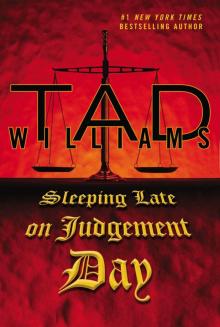 Sleeping Late on Judgement Day
Sleeping Late on Judgement Day Stone of Farewell
Stone of Farewell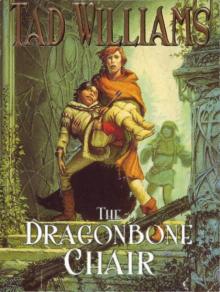 The Dragonbone Chair
The Dragonbone Chair Sea of Silver Light
Sea of Silver Light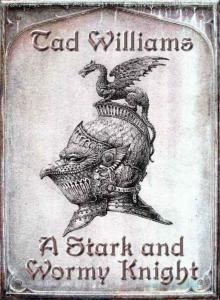 A Stark and Wormy Knight
A Stark and Wormy Knight The Heart of What Was Lost
The Heart of What Was Lost Diary of a Dragon
Diary of a Dragon Last King of Osten Ard 02 - Empire of Grass
Last King of Osten Ard 02 - Empire of Grass To Green Angel Tower, Volume 1
To Green Angel Tower, Volume 1 The Dirty Streets of Heaven
The Dirty Streets of Heaven River of Blue Fire
River of Blue Fire The Very Best of Tad Williams
The Very Best of Tad Williams Mountain of Black Glass
Mountain of Black Glass Empire of Grass
Empire of Grass City of Golden Shadow
City of Golden Shadow Happy Hour in Hell
Happy Hour in Hell Shadowrise
Shadowrise Shadowmarch
Shadowmarch Brothers of the Wind
Brothers of the Wind Shadowheart
Shadowheart Bobby Dollar 02 - Happy Hour In Hell
Bobby Dollar 02 - Happy Hour In Hell The War of the Flowers
The War of the Flowers The Dirty Streets of Heaven bd-1
The Dirty Streets of Heaven bd-1 Tad Williams - The War of the Flowers (retail) (pdf)
Tad Williams - The War of the Flowers (retail) (pdf) Shadowheart s-4
Shadowheart s-4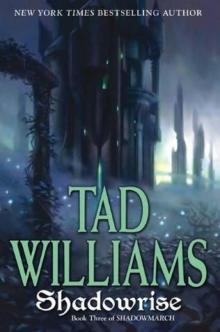 Shadowrise s-3
Shadowrise s-3 The Dirty Streets of Heaven: Volume One of Bobby Dollar
The Dirty Streets of Heaven: Volume One of Bobby Dollar The Stone of Farewell
The Stone of Farewell (Shadowmarch #1) Shadowmarch
(Shadowmarch #1) Shadowmarch The Secrets of Ordinary Farm of-2
The Secrets of Ordinary Farm of-2 Shadowmarch s-1
Shadowmarch s-1![Bobby Dollar [04] God Rest Ye Merry, Gentlepig Read online](http://i1.bookreadfree.com/i1/04/06/bobby_dollar_04_god_rest_ye_merry_gentlepig_preview.jpg) Bobby Dollar [04] God Rest Ye Merry, Gentlepig
Bobby Dollar [04] God Rest Ye Merry, Gentlepig Lightspeed Issue 33
Lightspeed Issue 33 Sea of Silver Light o-4
Sea of Silver Light o-4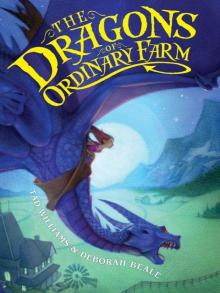 The Dragons of Ordinary Farm of-1
The Dragons of Ordinary Farm of-1 Shadowplay s-2
Shadowplay s-2 (Shadowmarch #2) Shadowplay
(Shadowmarch #2) Shadowplay